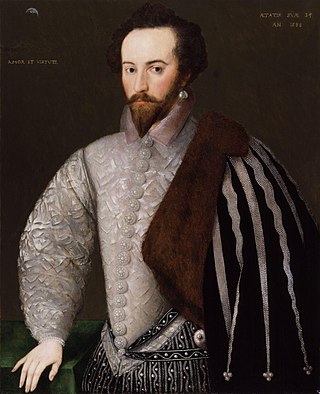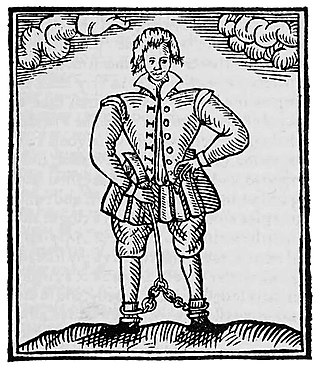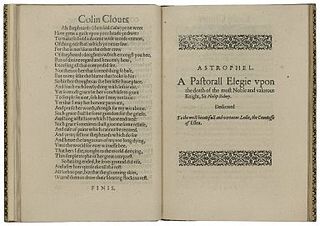Related Research Articles
This article presents lists of literary events and publications in the 16th century.
This article contains information about the literary events and publications of 1594.

The School of Night is a modern name for a group of men centred on Sir Walter Raleigh that was once referred to in 1592 as the "School of Atheism". The group supposedly included poets and scientists Christopher Marlowe, George Chapman, Matthew Roydon and Thomas Harriot.

Thomas Nashe was an Elizabethan playwright, poet, satirist and a significant pamphleteer. He is known for his novel The Unfortunate Traveller, his pamphlets including Pierce Penniless, and his numerous defences of the Church of England.

The Golden Treasury of English Songs and Lyrics is a popular anthology of English poetry, originally selected for publication by Francis Turner Palgrave in 1861. It was considerably revised, with input from Tennyson, about three decades later. Palgrave excluded all poems by poets then still alive.
Henry Willobie is the ostensible author of a 1594 verse novella called Willobie His Avisa, a work that is of interest primarily because of its possible connection with William Shakespeare's life and writings.

Henry Percy, 9th Earl of Northumberland, KG was an English nobleman. He was a grandee and one of the wealthiest peers of the court of Elizabeth I. Under James I, Northumberland was a long-term prisoner in the Tower of London, due to the suspicion that he was complicit in the Gunpowder Plot. He is known for the circles he moved in as well as for his own achievements. He acquired the sobriquet The Wizard Earl, from his scientific and alchemical experiments, his passion for cartography, and his large library.

Elizabethan literature refers to bodies of work produced during the reign of Queen Elizabeth I (1558–1603), and is one of the most splendid ages of English literature. In addition to drama and the theatre, it saw a flowering of poetry, with new forms like the sonnet, the Spenserian stanza, and dramatic blank verse, as well as prose, including historical chronicles, pamphlets, and the first English novels. Major writers include William Shakespeare, Edmund Spenser, Christopher Marlowe, Richard Hooker, Ben Jonson, Philip Sidney and Thomas Kyd.

Probably composed in the 1580s, Philip Sidney's Astrophil and Stella is an English sonnet sequence containing 108 sonnets and 11 songs. The name derives from the two Greek words, 'aster' (star) and 'phil' (lover), and the Latin word 'stella' meaning star. Thus Astrophil is the star lover, and Stella is his star. Sidney partly nativized the key features of his Italian model Petrarch, including an ongoing but partly obscure narrative, the philosophical trappings of the poet in relation to love and desire, and musings on the art of poetic creation. Sidney also adopts the Petrarchan rhyme scheme, though he uses it with such freedom that fifteen variants are employed.
Thomas Watson (1555–1592) was an English poet and translator, and the pioneer of the English madrigal. His lyrics aside, he wrote largely in Latin, also being the first to translate Sophocles's Antigone from Greek. His incorporation of Italianate forms into English lyric verse influenced a generation of English writers, including Shakespeare, who was referred to in 1595 by William Covell as "Watson's heyre" (heir). He wrote both English and Latin compositions, and was particularly admired for the Latin. His unusual 18-line sonnets were influential, although the form was not generally taken up.

William Ponsonby was a prominent London publisher of the Elizabethan era. Active in the 1577–1603 period, Ponsonby published the works of Edmund Spenser, Sir Philip Sidney, and other members of the Sidney circle; he has been called "the leading literary publisher of Elizabethan times."
The Shadow of Night is a long poem written by George Chapman; it was first published in 1594, in an edition printed by Richard Field for William Ponsonby, the prestigious publisher of Edmund Spenser and Sir Philip Sidney.
The Phoenix Nest was an anthology of poetry by various authors which was "set foorth" by an as-yet unidentified "R. S. of the Inner Temple Gentleman", in 1593. The title page identifies fourteen of the pieces contained therein, although there a total of seventy-nine poems, as well as three short prose pieces.
Events from the 1590s in England.
Thomas Edwards was an English poet who published two Ovidian epic poems Cephalus and Procris and Narcissus. Beyond his name, nothing is known with certainty of Edwards. He has been provisionally identified with a Shropshire law student of that name who transferred from Furnival's Inn to Lincoln's Inn in June 1587, where he shared a room with a known friend of John Donne. Edwards may have contributed the Latin verse to Adriaan van Roomen's Parvum theatrum urbium, published in 1595.
Walter Warner (1563–1643) was an English mathematician and scientist.
Nationality words link to articles with information on the nation's poetry or literature.

Shadow of Night is a 2012 historical-fantasy novel by American scholar Deborah Harkness, the second book in the All Souls trilogy. As the sequel to the 2011 bestseller, A Discovery of Witches, it follows the story of Diana Bishop, a historian who comes from a long line of witches, and Matthew Clairmont, a long-lived vampire, as they unlock the secrets of an ancient manuscript. Diana and Matthew travel back in time to 16th century London during the Elizabethan era.
Lodowick Bryskett, was a poet, translator, diplomat and Irish official. He served as Special Ambassador from England to Tuscany in 1600-01.

Astrophel: A Pastorall Elegy upon the Death of the Most Noble and Valorous Knight, Sir Philip Sidney is a poem by the English poet Edmund Spenser. It is Spenser's tribute to the memory of Sir Philip Sidney, who had died in 1586, and was dedicated "To the most beautiful and vertuous Ladie, the Countesse of Essex", Frances Walsingham, Sidney's widow.
References
- 1 2 3 4 5 s:Roydon, Matthew (DNB00)
- ↑ Christopher Hill, Intellectual Origins of the English Revolution (1965), p. 142-3.
- ↑ Dedication to George Chapman's The Shadow of Night (1594) in "Notices of Mathew Roydon", Egerton Brydges, ed., Restituta: Or, Titles, Extracts, and Characters of Old Books in English Literature, Revived (1815) p. 51.
- ↑ Martin Garrett, Sidney: The Critical Heritage (1996) p.105-6.
- ↑ The works of Thomas Nashe, ed. Ronald B. McKerrow, 5 vols, Oxford, 1958, vol. 3, p. 323.
- Attribution
![]() This article incorporates text from a publication now in the public domain : "Roydon, Matthew". Dictionary of National Biography . London: Smith, Elder & Co. 1885–1900.
This article incorporates text from a publication now in the public domain : "Roydon, Matthew". Dictionary of National Biography . London: Smith, Elder & Co. 1885–1900.